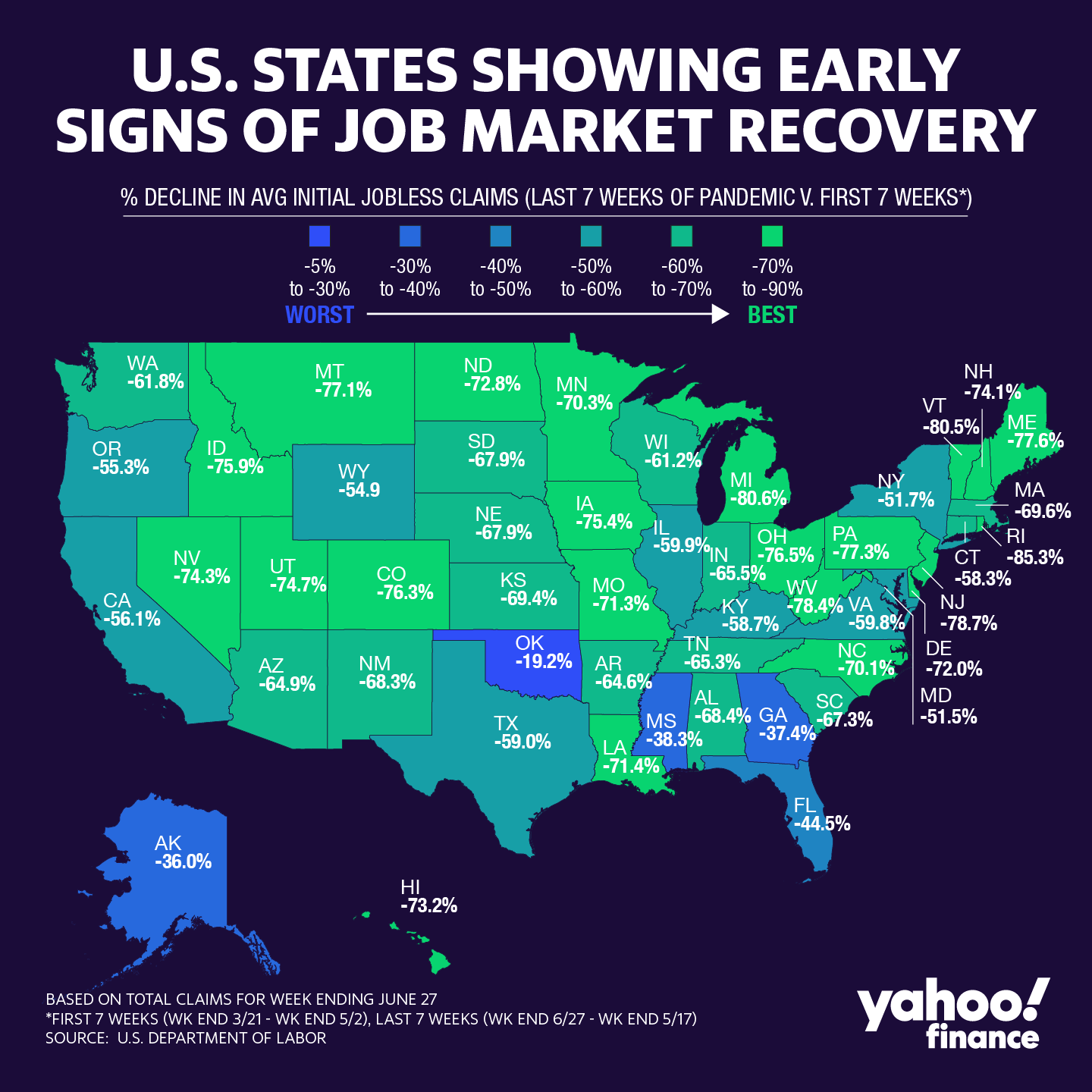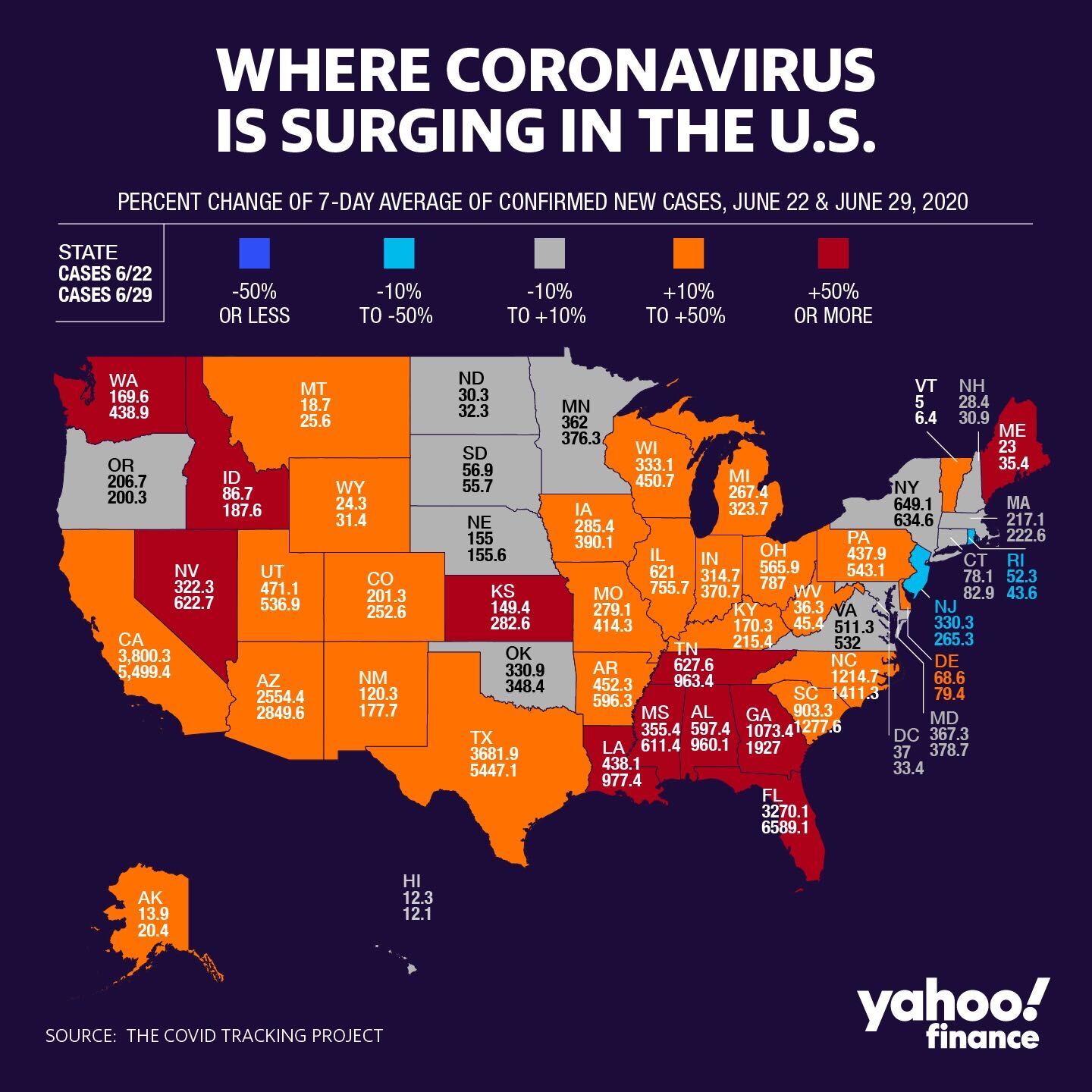Large majority of Americans say U.S. is a mess
This Fourth of July, a new Yahoo News/YouGov poll shows that no matter how polarized they might be politically, Americans finally seem to agree on something: that everything about America is getting worse.
In his 1989 farewell address, President Ronald Reagan famously described the United States as a “shining city on a hill” — a beacon of hope and a model for the rest of the world. According to the Yahoo News/YouGov survey, which was conducted between June 29 and July 1, a majority of Americans (52 percent) believe that Reagan’s remark was accurate at the time he said it; only 21 percent disagree.
Yet today a staggering 62 percent of Americans say the U.S. is no longer that shining city on a hill. Just 17 percent say it still is.
“I am in Texas, COVID-19 is on the rise, and there’s quite a lot of anxiety,” said poll respondent Alexandra Foulks, a 62-year-old native of France who now lives in Dallas with her husband.
Foulks scoffed at the notion of America as the proverbial “shining city on a hill.”
“We are banned from Europe right now,” she said. “How could we be shining?”
Overall, the poll found the American people in a historically pessimistic mood heading into a holiday weekend traditionally marked by family cookouts and fireworks displays — events that have been canceled across the country in the midst of a surging coronavirus pandemic that has killed more than 128,000 Americans and is currently infecting more than 50,000 each day.
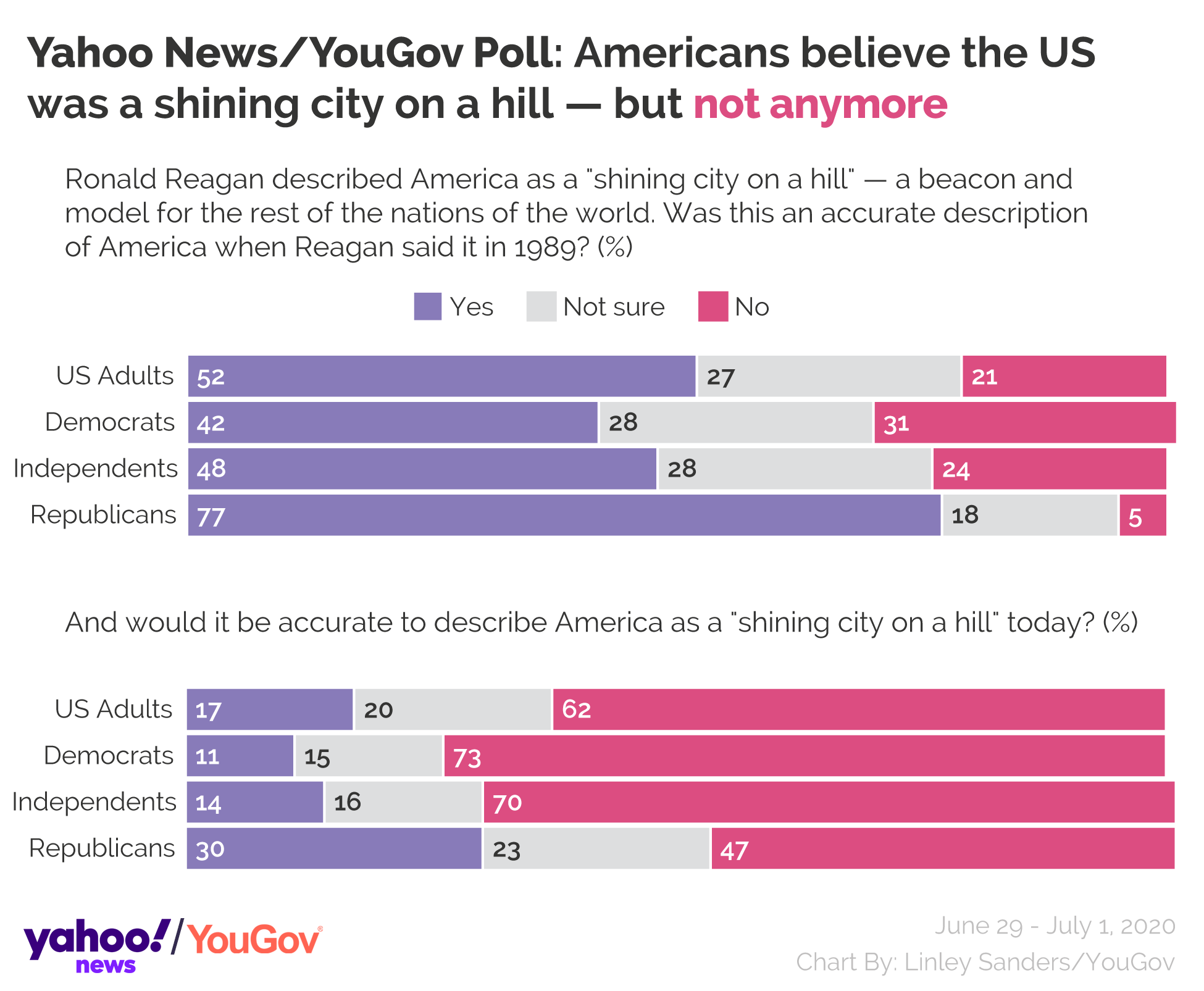
The spiraling pandemic may be the main reason for the public’s gloomy outlook, with a full 65 percent of Americans saying COVID-19 is “getting worse” versus just 16 percent who say it’s “getting better.” Likewise, the number who think the U.S. coronavirus response has been “worse than expected” (49 percent) outpaces the number who think the response has been “better than expected” (11 percent) by 4 to 1 — while record numbers now predict that the deadly pathogen will be a problem for more than three months (68 percent) and believe they are very or somewhat likely to get infected themselves (46 percent).
Jeff Blankenship, a 52-year-old Huntsville, Ala., man who worked as a traffic engineer before a workplace injury put him on disability, said he has been surprised by how casual many people have been about the pandemic threat.
“We are forging ahead in Alabama too quickly,” Blankenship said. “I wish everyone would take this damn virus a lot more seriously.” He is also concerned about deteriorating race relations. But despite the many challenges America confronts this Independence Day, Blankenship said he does “stand up proud for the United States of America. ... This virus got everything screwed up, but after this I hope the economy will bounce back.”
Yet America’s bleak outlook goes beyond the pandemic. Sixty-four percent of Americans, including 67 percent of Democrats and 60 percent of Republicans, say race relations — the focus of mass protests since George Floyd was killed by a Minneapolis police officer in late May — are also getting worse, versus just 12 percent who say race relations are getting better. Sixty-one percent say the economy is getting worse, versus just 21 percent who say it’s getting better. Sixty percent say America’s standing in the world is getting worse, versus just 15 percent who say it’s getting better. And 58 percent say crime is getting worse, versus just 10 percent who say it’s getting better. (Violent crime in the U.S. has fallen sharply over the last quarter-century; it has also declined during the pandemic.)
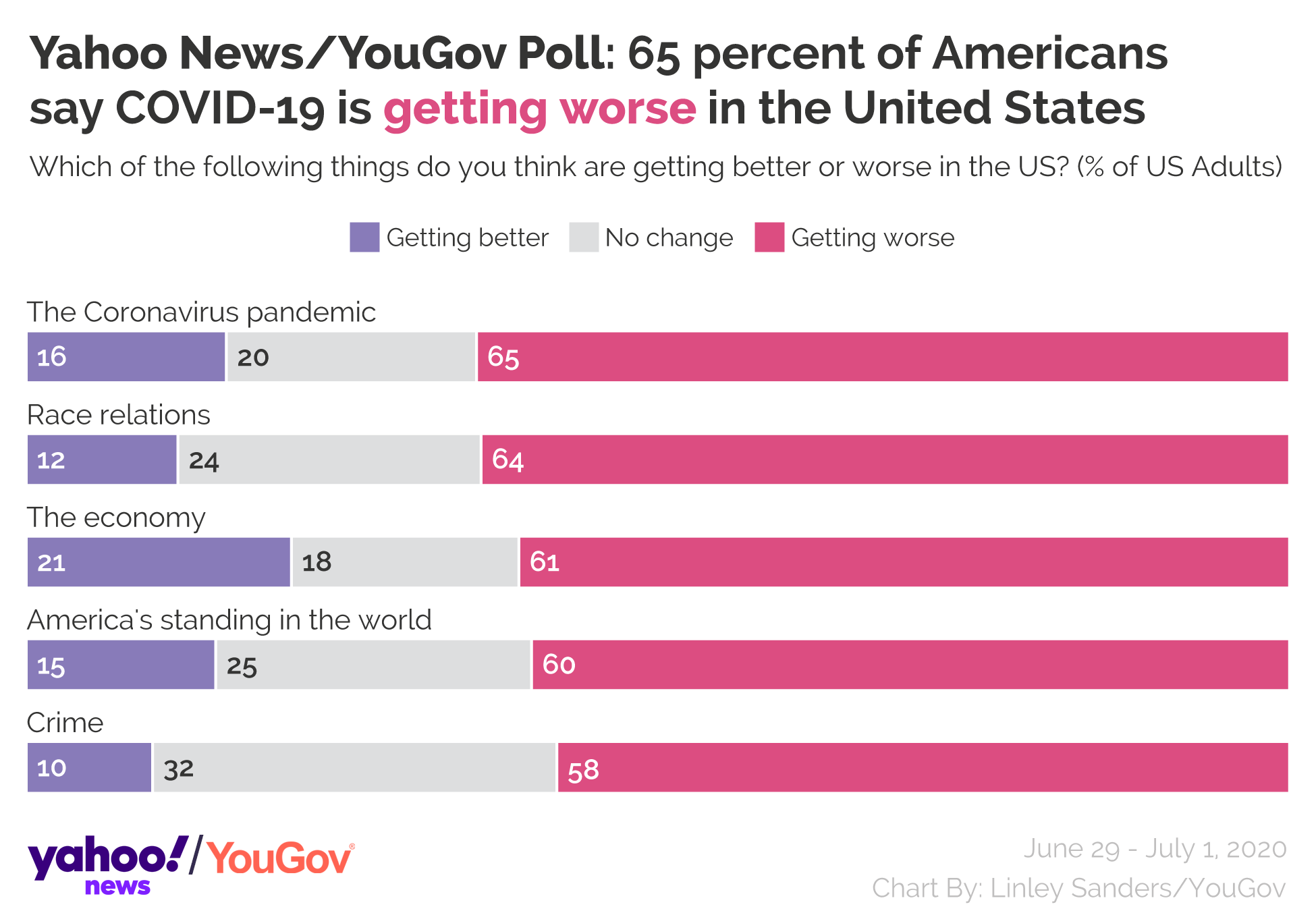
As a result, a plurality of Americans (43 percent) — including similar numbers of Democrats (47 percent), Republicans (43 percent) and independents (44 percent) — say they were more proud of America when they were “growing up” than they are now. Across the board, the number who say they used to be “less proud” of America is about 20 to 25 points lower.
This dissatisfaction is driven largely by white Americans, who say they felt more pride in America while growing up by a wide 48 percent to 21 percent margin. Pluralities of Black Americans (41 percent) and Latino Americans (48 percent) say they are neither more nor less proud of America today, perhaps reflecting their personal experience of the nation’s racial troubles.
Asked which words they would and would not use to describe American society, the public gravitated toward the pejorative: “selfish” (47 percent yes vs. 11 percent no), “corrupt” (39 percent yes vs. 13 percent no), “hypocritical” (45 percent yes vs. 8 percent no), “irresponsible” (44 percent yes vs. 12 percent no) and “unfair” (33 percent yes vs. 15 percent no). More people said they would not describe the U.S. as “equal” or “just” than say they would.
William Wood, a 52-year-old retail supervisor in Lebanon, Ohio, said that while he is still proud to be an American and that he believes the United States is “still the nation with the most developed sense of equality,” his own experience as a retail worker in the pandemic underscores his sense that some things aren’t equal. Wood said he is required to wear a mask at work while many customers are permitted not to.
“Why is it OK for some to wear masks and others not to wear masks?” he said.
The breakdown of social discourse has hurt us, Wood believes. He said he is bothered by the tendency many Americans have to develop what he called “knee-jerk reactions” to political debates when they are armed with too little information.
Ultimately, Wood worries about how divided we have become, but thinks we can solve it “if we turn off the TV and go outside and talk to our neighbors. We’ll find out we’re a lot more alike than we think.”
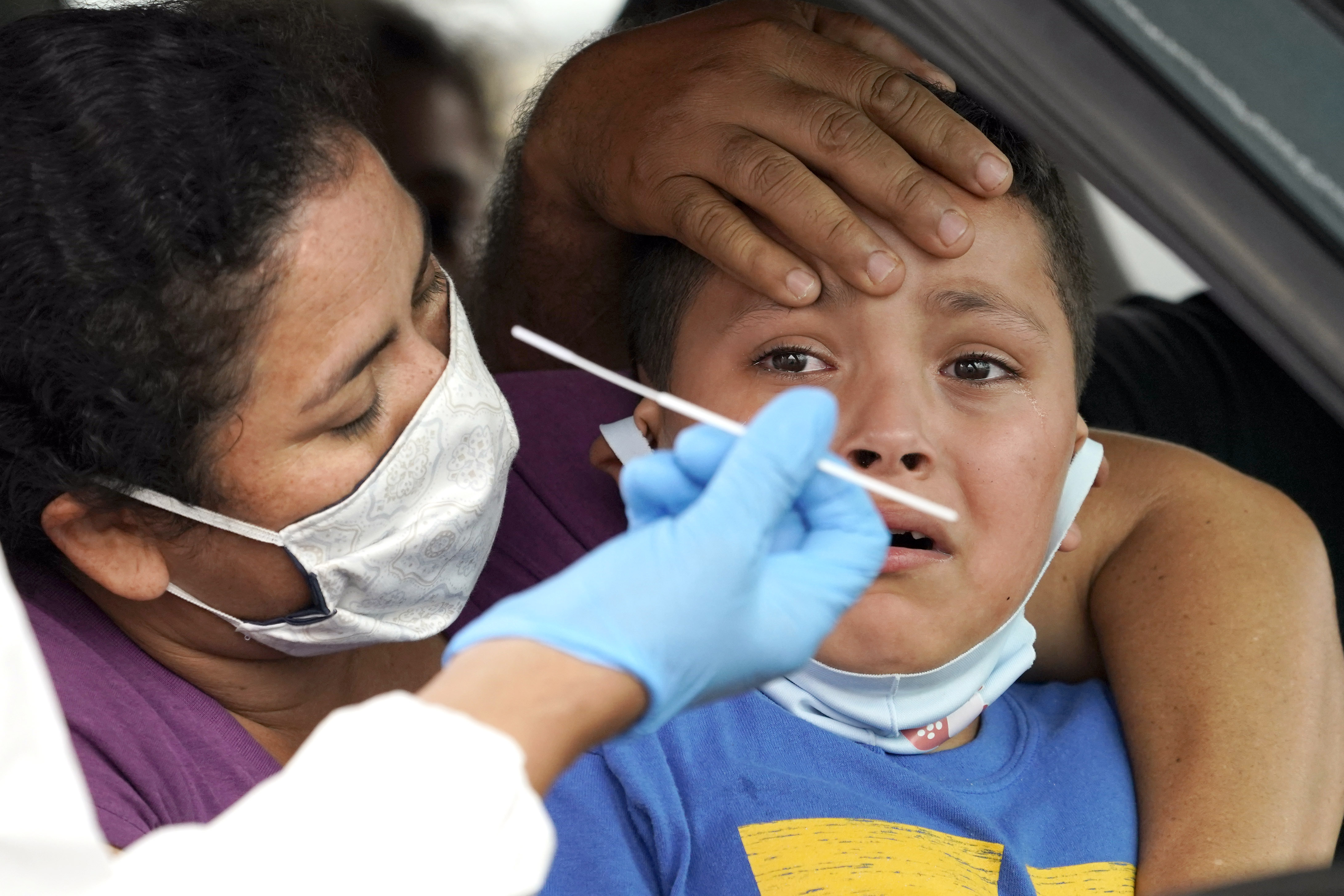
The poll results indicate that America’s longstanding sense of its own exceptionalism may be on the wane. Just 40 percent of Americans agree that the United States is “an exceptional country whose values, history and political system are worthy of universal admiration.” The remaining 60 percent see the U.S. as “a country with its own unique strengths and weaknesses, much like other countries.”
For many, those weakness seem particularly pronounced today. Pluralities of Americans, in fact, say “the quality of life” is now better in Canada (44 percent better vs. 13 percent worse), Sweden (45 percent vs. 17 percent), Australia (35 vs. 15 percent), France (29 percent vs. 26 percent) and Japan (33 percent vs. 27 percent) than it is in the U.S. Only China, among the choices in the poll, is perceived as having a lower quality of life.
If the American dream is defined as the belief that your children will have a better life than you did, then for most Americans the dream isn’t coming true. A full 59 percent say they are either “somewhat worse off” (17 percent), “much worse off” (10 percent) or “about the same” (32 percent) as their own parents — while a similar 56 percent predict their own children will be either somewhat worse off (12 percent), much worse off (7 percent) or about the same (37 percent) as them.
Americans also largely agree — with predictable partisan variation — that President Trump is making matters worse. Half (50 percent) say Trump has “hurt” America’s standing in the world, compared with just 30 percent who say he has “helped” it. A plurality (46 percent) say Trump makes them feel “embarrassed” about their country — nearly 20 points higher than the number who say he makes them feel “proud” (28 percent). Most Americans say the president embodies American values either “very poorly” (43 percent) or “somewhat poorly” (13 percent).
And though Democrats largely account for that divide — 72 percent of them characterize Trump as a very poor embodiment of U.S. values, versus just 9 percent of Republicans — the contrast with other recent presidents is striking. Sizable majorities say Jimmy Carter (70 percent), Ronald Reagan (75 percent), George H.W. Bush (65 percent), Bill Clinton (54 percent), George W. Bush (58 percent) and Barack Obama (63 percent) embody American values either very or somewhat well.
Only 44 percent say the same about Trump.
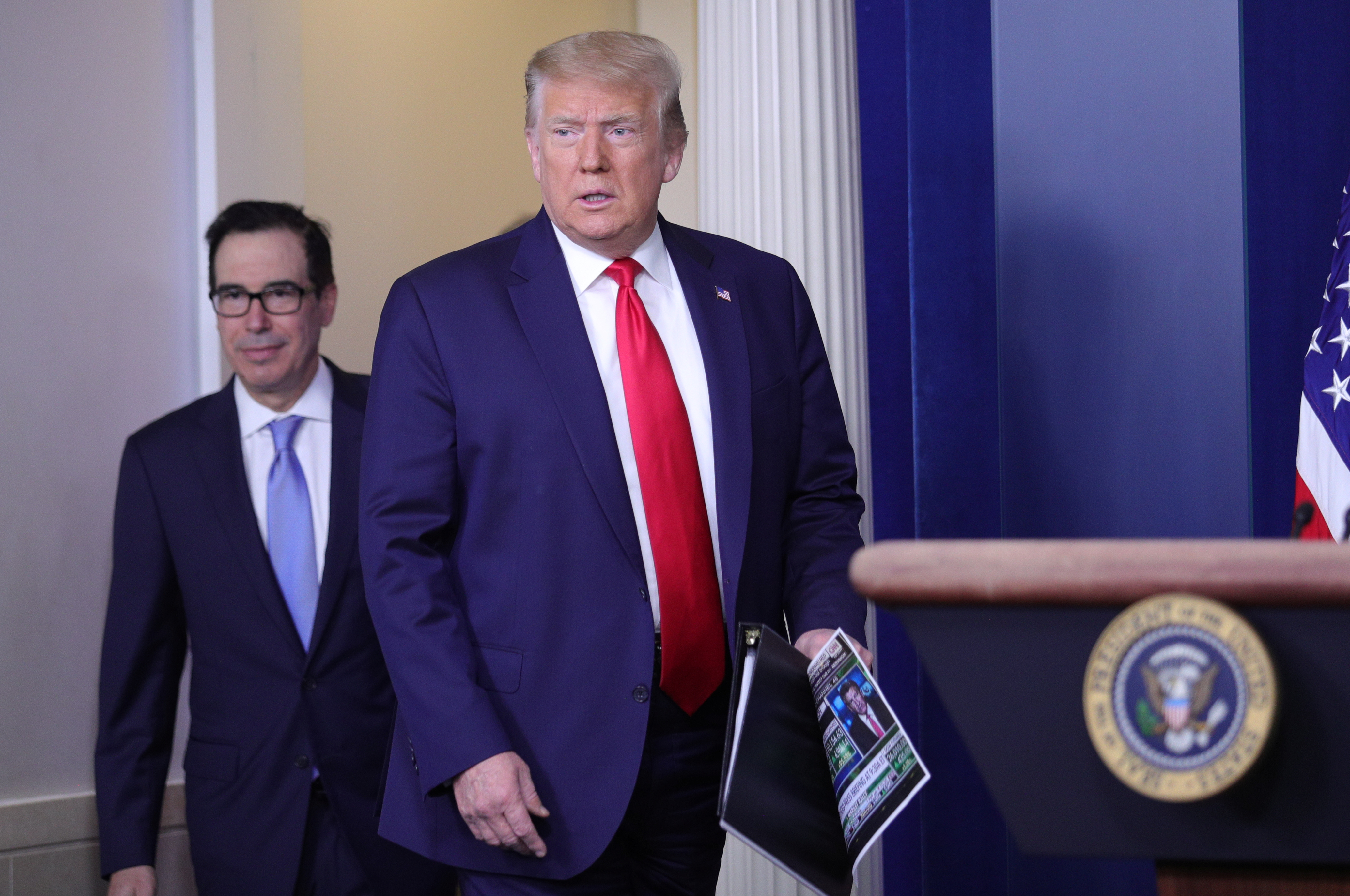
The reason may be that a wide plurality of Americans (44 percent) “strongly agree” that Trump “often puts his own interests ahead of the country’s.” Another 19 percent “somewhat agree.” Just 28 percent of Americans strongly agree that former Vice President Joe Biden, the presumptive Democratic Party nominee, puts his own interests first. And though the latest Yahoo News/YouGov poll shows Biden leading Trump by a smaller margin (45 percent to 40 percent) than other recent polls do, the challenger is beating the incumbent on questions of who would do a better job handling the coronavirus pandemic (39 percent Biden vs. 32 percent Trump), race relations (42 percent Biden vs. 28 percent Trump), immigration (39 percent Biden vs. 36 percent Trump) and foreign policy (39 percent Biden vs. 36 percent Trump).
Majorities of Americans (54 percent) also say they trust Democrats and the Democratic-controlled House of Representatives to “do what’s best for the country” over Republicans and the Republican-controlled Senate (46 percent).
Despite all the doom and gloom, however, slivers of America’s trademark optimism remain. A plurality of Americans (43 percent to 35 percent) agree with the Mississippi Legislature’s decision to remove the Confederate battle emblem from its state flag; a similar plurality (42 percent to 31 percent) favors Princeton University’s decision to remove Woodrow Wilson’s name from its school of public policy. Both are seen as signs of progress.
However skeptical Americans may be about their elected leaders, they also trust those politicians to “do what’s best for the country” more than the CEOs of large corporations (70 percent vs. 30 percent) and more than the protesters who have taken to the streets in recent weeks (67 percent vs. 33 percent) — with large majorities of Democrats, Republicans and independents agreeing on both counts.
In the end, 61 percent of Americans describe themselves as “patriotic,” and far more of them, including 58 percent of Republicans, say patriotism means “pushing America to be a better country” (68 percent) rather than “loving America just the way it is” (32 percent) — which may be why a plurality (46 percent) still believe the nation’s “best days are still to come.”
Even so, that means most Americans are either unsure how to answer the question about America’s best days (29 percent) or believe those days are “behind us” (25 percent) — a reflection of what has become one of the most uncertain and unsettling moments in recent U.S. history.
Suzanne Smalley contributed reporting to this story.
____________
The Yahoo News survey was conducted by YouGov using a nationally representative sample of 1,525 U.S. adult residents interviewed online between June 29 and July 1, 2020. This sample was weighted according to gender, age, race, and education, as well as 2016 Presidential vote, registration status, geographic region, and news interest. Respondents were selected from YouGov’s opt-in panel to be representative of all U.S residents. The margin of error is approximately 3.2 percent.
_____
Read more from Yahoo News:





